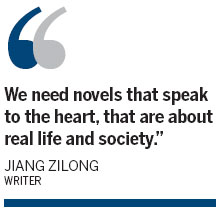Books
Workplace stories, teen romance top novels of 2010
Updated: 2011-01-14 10:18
By Yang Guang (China Daily)
More than 3,200 novels were published in 2010, with the most popular being about officialdom, the workplace and teen romance.
Yan Jingming, literary critic and chief editor of Wen Yi Bao newspaper, provided this information at a recent seminar that brought together seven writers and seven literary critics and editors to share their insights into the present and future of Chinese novels.
Literary critic Chen Xiaoming said Chinese literature had made progress in the first decade of the 21st century, with the emergence of more realistic fiction as opposed to the experimental novels of the 1980s and 1990s.
He also said the language now seen in Chinese novels is more aesthetic with writers not borrowing as much from the linguistic elements of overseas writing, while incorporating the form of the Western novel.
The professor of Chinese literature at Peking University said that in the 1990s, mention of the writings of Yu Hua or Zhang Wei would invariably entail mention of Franz Kafka or Leo Tolstoy.
"But now they are no longer writing in the shadow of their monumental predecessors."

Writer Jiang Zilong, best known for his "reform novel" (stories set in the reform and opening-up period of the early 1980s) Director Qiao Takes Over, pointed out that today's novels are not thought-provoking.
"We need novels that speak to the heart, that are about real life and society."
Many blame the problems of literature on its growing commercialization since the 1990s. But for literary critic Lei Da, commercialization is a double-edged sword.
"The 1990s witnessed a high tide of literary creations," he said and cited the example of Mao Dun Literature Prize-winning White Deer Plain and widely acclaimed historical fiction Zeng Guofan, both published in 1993.
"The popularity of the two novels had a lot to do with the commercialization of the publishing industry," he said.
Lei emphasizes the need for novels that capture what is happening to the Chinese spirit in a changing world.
"Writer Liu Zhenyun's A Sentence is Worth Thousands, for instance, is innovative in exploring the loneliness of the Chinese, in their constant search for someone to talk to."
Cui Daoyi, former deputy chief editor of People's Literature magazine, put novels into four categories according to their subject matter and ranked them in order of literary value - those about men and human destiny, those with strong characterizations, those with complex plots, and those that moralize.
For Cui, Whisper of the Wind, the most recent spy novel by Mao Dun Literature Prize winner Mai Jia, is representative of novels with a complex plot, that can easily draw a reader's curiosity and interest. But he ranked Chi Zijian's Snow and Raven - about a plague in Harbin, Northeast China, 100 years ago - higher, saying it is written with feeling.
Cui said when Chi went on a field trip to the disaster site, she was touched by the calm of those residing on the banks of the Songhua River. The novel is more about the courage and perseverance of men in the face of death than about the plague itself.
"The best novels are about men's characters and destinies in a certain period of history," he said.
E-paper

Sindberg leaves lasting legacy
China commemorates Danish hero's courage during Nanjing Massacres.
Crystal Clear
No more tears
Road to the Oscars
Specials

NPC & CPPCC sessions
Lawmakers and political advisers gather in Beijing to discuss major issues.

Sentimental journey
Prince William and Kate Middleton returned to the place where they met and fell in love.

Rent your own island
Zhejiang Province charts plans to lease coastal islands for private investments
